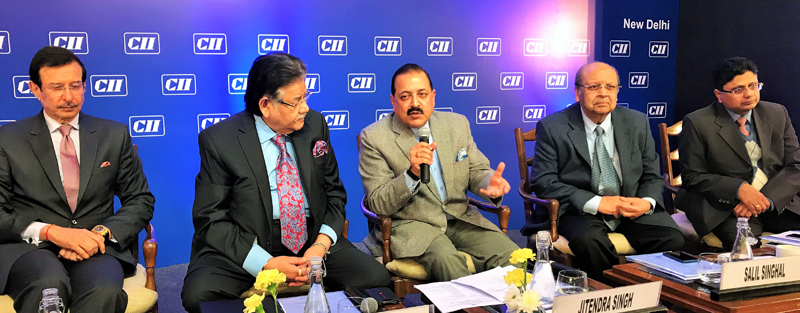
Excelsior Correspondent
NEW DELHI, Jan 23: Union Minister Dr Jitendra Singh, who is also incharge Department of Personnel & Training (DoPT), has asked the State Governments to implement 10 pc quota for Economically weaker sections, as approved by the Central Government and for which the legislation was recently passed by the parliament.
Delivering keynote address at the Summit on “Integrity and Transparency in Governance”, organized by Confederation of Indian Industry (CII), Dr Jitendra Singh observed that the announcement of 10 pc reservation for economically weaker sections was a much awaited decision, which had been evaded by the earlier Governments, but it is Prime Minister Narendra Modi who had the courage as well as conviction to take this initiative. He said, this will go a long way in the direction of seeking equitable opportunities for all sections of society, particularly youth.
While some States have been prompt to announce the implementation of 10pc reservation for economically weaker sections, he said, the DoPT had advised the other State Governments also to follow the same.
Recounting some of the major decisions taken in the DoPT during the last five years, Dr Jitendra Singh recalled that within six months of the Modi Government taking over in May 2014, the age-old practice of getting certificates attested by gazetted officers, which was a legacy of the British Raj, was done away with, thus sending a loud message across the country that Prime Minister Modi and his Government had the capacity to trust the youth of this country.
In a similar vein, Dr Jitendra Singh said, from 1st January 2016, interviews for the selection in Government jobs were abolished, in order to eliminate the possibility of malpractice in selection by giving disproportionately high marks in the interview with the intention of neutralizing the merit of the written test. This decision, he said, had provided a level-playing field for youth from all backgrounds and had been widely acclaimed across the country.
Dr Jitendra Singh said, the history of independent India will record that it had taken 30 years for the “Prevention of Corruption Act 1988” to be amended in 2018, in order to make it more effective as well as realistic. The legislation brought to the Parliament by the Ministry of Personnel during the Monsoon Session last yea,r introduced the new provision for legal action against bribe-giver as well and at the same time, ensured certain safeguards for honest performing officials so that they do not feel unduly intimidated from performing to the best of their capabilities.
The present Government, Dr Jitendra Singh recalled, came in with the Prime Minister Modi’s call for “maximum governance, minimum government” and we have walked the talk by bringing in maximum transparency and citizen participation through different means, including the use of latest on-line technologies.
Others who spoke in the special session included Sumit Mazumdar past President CII, Salil Singhal and Deep Kapori.

